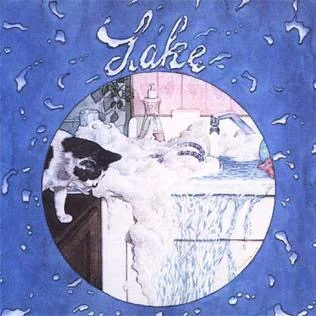[TL;DR summary at the end]
In 1977, a German rock band with an English frontman released a single and album in the U.S. that would mark their greatest success in the States. The single, "Time Bomb," reached #83 on the charts. The album, the self-titled Lake, rose all the way to #92.
Given their low place on the charts—and subsequent lack of Top 40 radio airplay—I never should have heard of Lake. I owe my awareness of Lake's first album to a high-school creative-writing teacher named Edd Fish. His classroom at Centralia High School was set apart from all the others, located by itself and fully enclosed within a larger common area.
The classroom had a large stereo system, which Fish used for playing his favorite albums while we students wrote assignments. The room's out-of-the-way location made it possible to play music without disturbing other classes. But it was Fish's mid-'70s counter-culture attitude toward teaching and creativity that made it happen. One of those albums was Lake by Lake. I was hooked the minute I heard the opening lines of "[Time Bomb](https://youtu.be/B4kv46ZF6bI)," the third song on Side 1:
"I feeeeeeel like I'm sittin' on a time bomb, baby."
As an avid album buyer in the 1970s-1980s, I believed that if I liked at least three songs on an album, the odds were good that I would enjoy the entire album. This time, I think I bought Lake primarily on the strength of "Time Bomb" alone.
"Time Bomb" is something of an anomoly on the album, though. With a high-tenor/falsetto male vocal accompanied by a keyboard-driven instrumental track, the song sounds a lot like a Supertramp track. (Not a bad thing.) The rest of Lake is much more classic 1970s rock band: overdriven Les Pauls and generous helpings of Hammond organ.
And I loved it all.
Naturally, I wanted to learn as much as I could about Lake. But there was almost no information about the band on the Lake album sleeve. A small band photo. The band names: Martin Tiefensee, James Hopkins-Harrison, Alex Conti, Dieter Ahrendt, and Geoffrey Peacey. No songwriting credits. No lyrics. Intriguingly, the liner notes did mention that the album was mixed in Hamburg, offering the faintest suggestion of a German connection.
Because the lead vocals were performed by James Hopkins-Harrison, an Englishman singing without a noticeable accent, I didn't have a clue that Lake itself was not a North American band like Grand Funk Railroad or Bachman-Turner Overdrive. (The band's current Web site draws comparisons to The Beach Boys, Doobie Brothers, and Steely Dan...none of which ring true to me. Your mileage may vary.)
The music felt both familiar and fresh, moving from the pop approach of "Time Bomb" to the mid-tempo rock of "On the Run" and the everyone-gets-a-solo jam of album closer "Between the Lines." And in a nod to the mood of the mid-1970s, there's even "Jesus Came Down." (It is, perhaps, the weakest song on the album, much like the Freddie Mercury-penned "Jesus" is often cited as the weakest track on Queen’s first album. Set aside the vapid lyrics, however, and the melodies here are as strong as anything else on the record.) Each song showcases the band’s excellent musicianship. These guys can play.
If you have never before heard of Lake, you might assume they were a one-album wonder—or maybe not even a "wonder," given the fact that they never really broke through into the mainstream. While they never again charted in the States, Lake has survived numerous lineup changes over the decades and continues to exist and tour today (although only one original member, Alex Conti, remains). Far from being a one-album band, Lake has released a total of 16 albums, including studio recordings, live albums, and various compilations.
I own the first three Lake albums: Lake, Lake II, and Paradise Island. But, for me, the first one is still the best. In eight straightforward songs and a trim 37 minutes, Lake delivers an entertaining and always melodic journey through 1970s classic American rock with a dash of European inventiveness.
TL;DR — In eight songs and 37 minutes Lake (1977) delivers an entertaining and always melodic journey through 1970s classic American rock with a dash of European inventiveness.
To Learn More:
Band Page (English, translated a bit clumsily from the German): https://www.lake-music.de/en/history.html
Wikipedia: https://en.m.wikipedia.org/wiki/Lake_(German_band)
